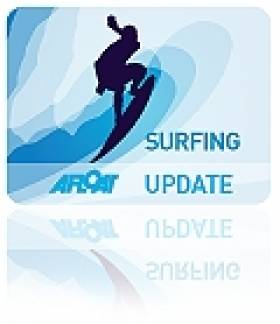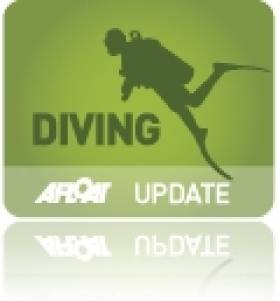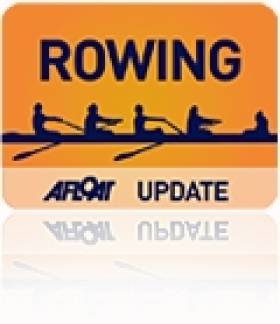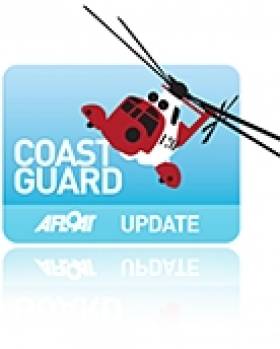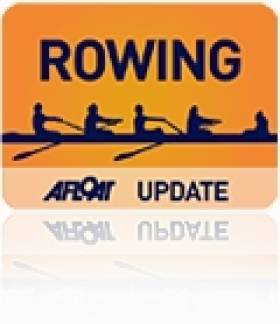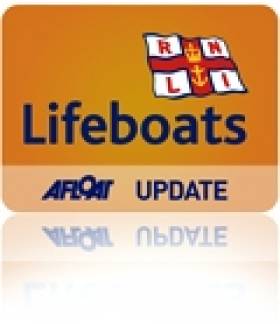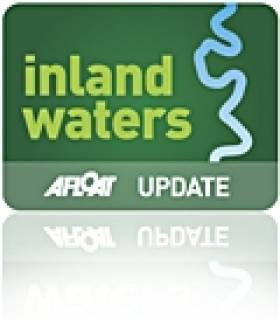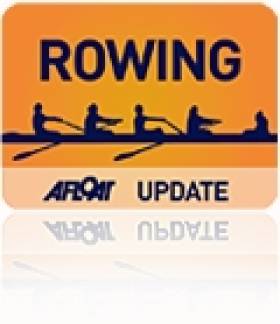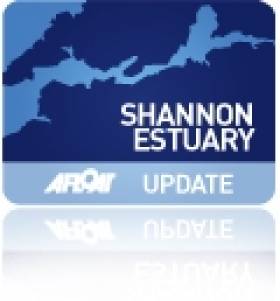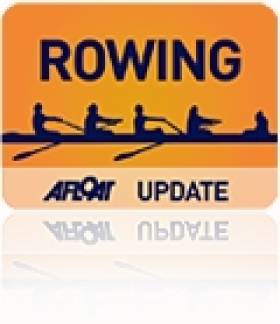Displaying items by tag: Shannon
Shannon Wave Surfing Could Be The Next Big Thing
#Surfing - First the Dutch are pioneering canal surfing - and now some intrepid Irish surfers are in on the act, proposing a river wave on the Shannon as the next big surfing hotspot.
The Limerick Leader reports on UL student Paul Deering and his friend Kalani Moore who have demonstrated the potential of the standing wave at Curragower Falls for more than the usual canoe paddlers.
“It could potentially attract surfers from all over the world,” said Deering, making reference to a similar wave on the Esibach in Munich, Germany that's been a focal point for European surfers since the 1970s.
The Limerick Leader has more on the story HERE.
Offaly Diver Raises Bronze Age Sword From Shannon
#Diving - A Bronze Age sword has been plucked from the River Shannon in Co Offaly by a local diver, according to the Irish Independent.
And it's only the latest in a series of historical finds by members of the Shannonside Sub Aqua Club in Banagher, which has previously fished out Viking and Celt weaponry from the river.
The latest find is thought to be some 3,500 years old, and was only discovered by accident when diver Michael O Ruairc was in a routine search and rescue exercise.
The Irish Independent has more on the story HERE.
O'Malley Takes Junior Title at Irish Rowing Championships
ROWING: David O’Malley won the junior single sculls title at the Irish Rowing Championships at the National Rowing Centre today. The St Michael’s man carved out an early lead over last year’s champion Conor Carmoday of Shannon and stretched it to two and a half lengths by half way. Carmody, under pressure himself from Waterford’s Andrew Goff, cut the lead in the closing stages, but O’Malley held on.
The men’s senior doubles was won impressively by Gary O’Donovan and Shane O’Donovan of Skibbereen from Eimantas Grigalius and Dave Neale of Three Castles, while NUIG/Cork won the women’s senior four. The women’s junior doubles was won by Oisin and Dervla Forde, who live in Torrevieja in Spain, but were campaigning for Cork Boat Club.
Irish Rowing Championships, National Rowing Centre, Cork (Selected Results, Finals)
Men
Four, coxed – Intermediate: 1 NUIG 6:26.37, 2 Carlow 6:29.33, 3 Neptune 6:36.71.
Sculling, Quadruple – Novice, coxed: 1 Queen’s 6:49.52, 2 Clonmel 7:01.83, 3 Kenmare 7:17.56.
Double – Senior: 1 Skibbereen 6:30.22, 2 Three Castles 6:34.96, 3 UCC 6:45.32.
Single – Junior: 1 St Michael’s (D O’Malley), 2 Shannon (C Carmody), 3 Waterford (A Goff).
Women
Four – Senior: 1 NUIG/Cork 6:57.92, 2 Trinity 7:09.18, 3 Skibbereen 7:16.93.
Four, coxed – Club: 1 NUIG A 7:25.50, 2 UCC 7:33.87, 3 Skibbereen 7:38.30.
Pair – Intermediate: 1 St Michael’s 7:49.72, 2 Trinity 7:53.27, 3 Shannon 7:53.29.
Sculling
Double – Junior: 1 Cork 7:26.87, 2 Belfast 7:32.25, 3 Commercial 7:36.33.
#Coastguard - As the Facebook post above shows, the Irish Coast Guard has officially named the Shannon-based helicopter with the call sign Rescue 115 as Banríon na Spéire, or Queen of the Sky.
The search and rescue chopper, which was delivered to Shannon in February 2012, was the first of the coastguard's new fleet of Sikorsky S92 aircraft to go into service.
#ROWING: Kenny McDonald, the world champion indoor rower in the 40 to 49 lightweight class, will launch a bid on Sunday to break the Irish and world records in this class. McDonald, of Shannon Rowing Club, and Dubliner Jonathan Doyle, the man he replaced as champion earlier this year, will take each other on at St Michael’s Rowing Club in Limerick at 1 p.m. The Irish record is 6:21.7, held by Philip Healy, and the world record time is 6:16.8. It was set in January at the European Championships in Copenhagen by five-time Olympic medallist Eskild Ebbesen.
McDonald, who is a garda and an instructor in the Garda College in Templemore, set a time of six minutes 24.5 seconds when he won his title in Boston in February, but felt he could have gone faster. “The race went well, it was nice to win it, (but) I was going out at the back of my mind to break the world record. It went well for 1200 metres but the wheels started to come off at that stage. The last 800 metres I lost the focus. I definitely had a faster time in me.”
RNLI 'Shannon' Jet Boat is 50% Faster Than Other Lifeboats
#lifeboat – The first of the Royal National Lifeboat Institution's (RNLI) newest class of lifeboat, the Shannon, goes on station in the UK this month.
The Shannon is the first RNLI all-weather lifeboat to be powered by water jets instead of propellers, making it the most agile all-weather lifeboat in the charity's fleet. The lifeboat's water jets not only ensure it is the RNLI's most manoeuvrable all-weather lifeboat, but they also allow the Shannon to reach casualties in harder to reach places and in shallower waters.
The first boat will arrive at Dungeness lifeboat station in Kent on Friday 21 February 2014.
Capable of 25 knots, the Shannon is 50% faster than the lifeboats it will replace - meaning casualties will be reached quicker.
National Emergency Group Hears Of River Flooding Threat
#Floods - Fears that the Shannon and other rivers have no more capacity to absorb floodwaters are on the increase, as State agencies fighting the tides met in Dublin yesterday.
According to The Irish Times, the National Emergency Co-ordination Group was warned that with more heavy rain due over the next few days, Ireland's rivers have literally reached breaking point as waterlogged lands drain into our inland waterways.
But Environment Minister Phil Hogan said the present situation did not constitute a national emergency, in spite of some of the worst flooding ever experienced in Limerick and Cork over recent days.
The Irish Times has more on the story HERE.
Head of the Shannon Falls to Floods and Metro Moves to May
#Rowing: The Head of the Shannon, set for this Saturday, has fallen to the bad weather. The event, organised by Carrick-on-Shannon Rowing Club, cannot be held because the river is in flood. The weather forecast is for more high winds.
Irish rowing has had no on-the-water competitive events this year so far, as the St Michael’s, Kerry and Sligo heads have already been cancelled, though St Michael’s say they hope to stage their event on February 22nd.
The Dublin Metropolitan Regatta will now take place on May 17th, moving from its slot in June to fill the space left by the cancelled Queen’s University Regatta.
Environmental Award For EU-Funded Project On Lower Shannon
#Shannon - The MulkearLIFE project in the Lower River Shannon Catchment is the recipient of the Chartered Institution of Water and Environmental Management's (CIWEM) Irish Environment Award for 2013.
MulkearLIFE is a European Commission LIFE+ Nature project working to restore degraded habitats through the Mulkear Catchment, which forms part of the Lower Shannon Special Area of Conservation.
The €1.75-million project, which has been active since late 2009, is spear-headed by Inland Fisheries Ireland (IFI), which act as co-ordinating beneficiary and works with key project partners in the Office of Public Works and Limerick County Council. The National Parks and Wildlife Service (NPWS) acts as project co-financier.
A range of other stakeholders support the project including local authorities (North & South Tipperary County Councils) as well as other state bodies (ESB Fisheries, Teagasc, Coillte, EPA) and especially the local community (IFA, ICMSA, Mulkear & District Angling Association, local schools and school children, farmers and volunteers).
In granting its Environment Award for 2013, the Republic of Ireland Branch of the CIWEM noted that MulkearLIFE is one of the most exciting and important river restoration and nature conservation projects ever undertaken on a catchment basis in Ireland. It noted that the project's work is providing a "conservation blueprint" for future integrated catchment management.
The project, which is centred on the Mulkear Catchment, covering an area of approximately 650 sqkm across counties Limerick and Tipperary, is focused on the rehabilitation of degraded river habitats, in particular the conservation and enhancement of habitat for the Atlantic salmon, sea lamprey and European otter.
Other work has concentrated on the control and treatment of non-native invasive riparian plant species and work to enhance local biodiversity. Significant efforts have been directed to creating an enhanced environmental awareness of the importance of the Mulkear Catchment as a resource for all. The local farming community has played a key role in this regard.
MulkearLIFE manager Ruairí Ó Conchúir noted that the success of the project has been highly dependent on an active catchment management partnership process and on extensive outreach work to enhance environmental awareness for those living within or near the catchment.
He noted that the project has worked hard to promote the importance of the Mulkear Catchment on a regional, national and international.
Ó Conchúir stated that a major objective has been the development of strong community links through a comprehensive environmental educational programme within local schools, in addition to actively managed practical conservation outings undertaken by the Mulkear Conservation Volunteers.
Suzanne Dempsey, chairperson of the Republic of Ireland Branch of CIWEM, said she was delighted to acknowledge the contribution of MulkearLIFE in bringing community and government together to plan, manage and enhance the conservation status of the Lower Shannon SAC.
She congratulated all involved in MulkearLIFE, especially the lead partners in Inland Fisheries Ireland, the OPW and Limerick County Council and wished the project every success.
IFI chief Ciaran Byrne thanked CIWEM for the award and the acknowledgement of the work of IFI and its project partners, as well as all involved in the success of the project to date, and especially those involved in MulkearLIFE’s catchment management grouping and local farmers on the ground.
Minister of State Fergus O’Dowd commended the efforts of the MulkearLIFE team and the funding support of the European Commission LIFE+ Programme. He noted that the funding support was of critical importance in allowing the project to undertake much of its work over the last four years, and he expressed his hope that the work would continue into 2014.
Shannon Crew Third at Head of the Charles Rowing Regatta
#RowingHOCR: Shannon Rowing Club's first crew finished third of 24 crews in the men's masters eights at the Head of the Charles rowing regatta in Boston. Shannon's second crew placed 22nd.
The race was won by Kennebecasis of Canada. Molesey BC from England were second, just under 10 seconds faster than Shannon's first crew.
Head of the Charles Regatta, Boston (Irish interest; selected results)
Men's Masters Eights (40 plus): 3 Shannon 15:04.119; 22 Shannon 18:20.733


























